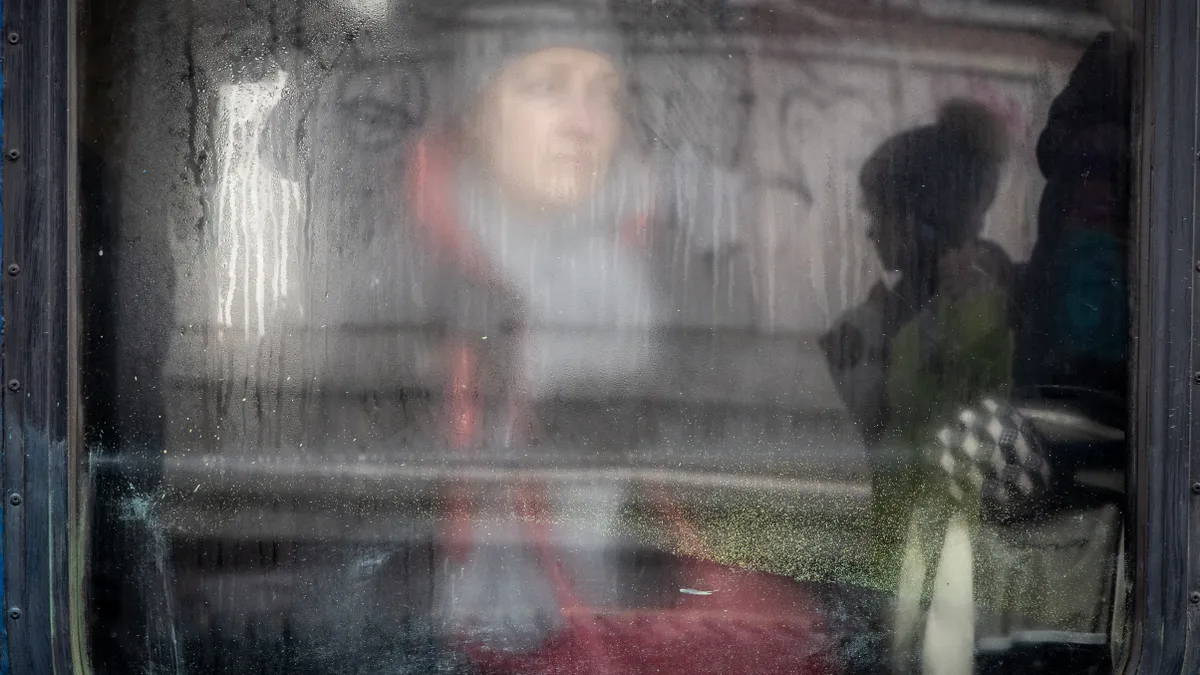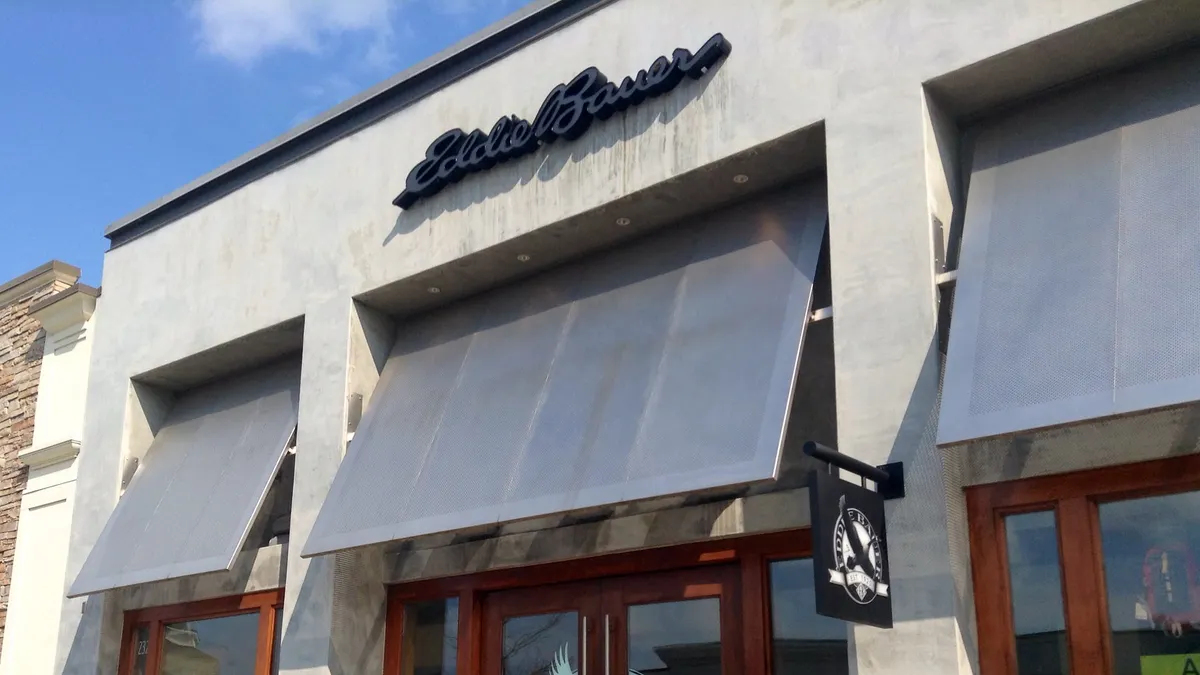In the days following Russia's invasion of Ukraine, most luxury brands stayed mum as they watched their share prices tumble and the European Union swiftly impose sanctions on exports and imports.
For Giorgio Armani, silence was the point. During Milan's fashion week, he cut the music for his runway show, one of the first designers to take a stand against the war, according to Vogue.
In a March 1 Instagram post, Vogue Ukraine called for concrete steps by the industry, urging "all international fashion and luxury conglomerates and companies to cease any collaborations" with Russia immediately, name-checking several top fashion companies.
"Vogue UA appeals to the global fashion industry to not keep silence during these dark times as it has the strongest voice," the magazine said.
Support for Ukraine
Overall, Russia's sales are about 5% of the global luxury market, according to Vogue business, citing Bernstein Research, and has been growing for two decades.
"Western brands' presence has only strengthened in the last 20 years, which means that the Russians like luxury and they are buying a lot of it," Thomai Serdari, professor of luxury marketing and branding at New York University's Stern School of Business, said by email. Serdari questioned the exemption of luxury goods from sanctions against Russia "while human lives are threatened and democracy as a whole is under attack."
"What brands should do instead is show their consumers how they are helping Ukrainians," she said.
In recent days, more haute couture brands are finding their voices, although, in contrast to recent statements by chief executives of a few U.S. retailers, they tend to be unattributed to any one person.
Early on, rumors of a carve-out for luxury goods swirled, prompting the Italian government on Feb. 25 to refute the suggestion that it was lobbying such an exemption. Last week, several fashion brands, including some with business in Russia, have condemned the incursion, offered aid to Ukraine and in some cases even suspended some Russia operations.
On Wednesday, Tapestry, (whose brands are Coach, Kate Spade and Stuart Weitzman), said in an email that it has no "direct business" in Russia or Ukraine and announced a $100,000 donation to the United Nations Refugee Agency, also known as the UNHCR; Kate Spade's foundation also donated $25,000 to a nonprofit organization helping displaced Ukrainian families.
LVMH, (whose many brands include Christian Dior, Givenchy, Louis Vuitton, Marc Jacobs and Tiffany), said in a statement that it will make a 5 million euro "first emergency donation" to the Red Cross and is otherwise "constantly tracking the situation and will adapt its measures as needed." Additionally, the company is activating a fund established last year in order to provide financial, operational and psychological support to its employees, "especially those directly affected by this conflict." An LVMH spokesperson didn't immediately confirm reports that the company has since decided to shutter its stores in Russia.
Unless otherwise noted, companies didn't provide Retail Dive information about their sales in Russia.
Prada in an Instagram post said that "the war in Ukraine is very worrying and source of great concern," and that it is donating to the UNHCR; the brand has also reportedly suspended operations in Russia. Kering, whose brands include Gucci, Saint Laurent, Bottega Veneta, Balenciaga and Alexander McQueen, said on Instagram Thursday that it would make a "significant donation to the UNHCR."
Balenciaga, though, went further. In a letter uploaded to Instagram, Creative Director Demna posted a highly personal letter, saying that the war in Ukraine has brought up the trauma of his own experience as a refugee, that he contemplated cancelling the brand's recent fashion show in Paris but then realized it would be "surrendering to the evil that has already hurt me so much for almost 30 years."
"This show needs no explanation," he also wrote. "It is a dedication to fearlessness, to resistance, and to the victory of love and peace."
The brand is also working with the World Food Programme in helping Ukrainians fleeing their homes.
Ditching the Russian market, at least for a while
Some luxury players are ceasing or scaling back their operations, at least temporarily. With several Russian banks cut off from the international monetary exchange system and shippers like DHL, FedEx and UPS suspending or limiting deliveries, many appear to have little choice.
Burberry, which said it's giving an unspecified amount to the Red Cross, said in an email, "Due to operational challenges brought on by the current situation, we have paused all shipments to Russia until further notice."
Upscale marketplace Net-A-Porter also has notified its Russian customers that orders aren't being filled, "Due to the current situation." Its rival Farfetch has posted a similar note on its Russian site, but on Instagram employed stronger language, saying it would contribute some amount to the UNHCR and writing, "We abhor war in all its forms and we are devastated by its effects on innocent communities everywhere."
In an emailed statement Friday, Chanel, citing its employees' safety, "the growing uncertainty and the complexity to operate," said it has temporarily paused its business in Russia, including closing stores and stopping deliveries. The fashion house has donated 2 million euros to relief organizations and its foundation "will also be working closely with its local partners to provide future critical support over the medium and long term to women and children impacted by this evolving situation."
On Friday via LinkedIn, Hermès expressed deep concern about the situation in Europe and said it has temporarily closed its stores in Russia. Also on Friday on LinkedIn, Richemont, whose brands include Azzedine Alaïa, Cartier, Chloé, Piaget and Van Cleef & Arpels, pledged "a significant donation" to Doctors Without Borders and said some of its brands are also supporting humanitarian efforts with their own contributions. The company also said it stopped operations in Ukraine on Feb. 24 and suspended its commercial activities in Russia on Thursday. In an email, Richemont said it hasn't disclosed its sales to Russia since 2016, when they dropped below 2% of sales.
These companies may seem to be in a tough spot, considering that, as the ruble nosedives, Russians are snapping up high-end jewelry and watches in order to preserve their wealth, with the chief of LVMH-owned Bulgari telling Bloomberg that the situation has "probably boosted the business."
What matters
Any short-term surge or loss of sales in Russia should not be what's top of mind at these brands, however, according to Alan Behr, fashion industry attorney and partner at Phillips Nizer.
"The moral imperative not to trade with Europe's first autocratic, imperialistic regime since WWII makes participating in a de facto luxury boycott better — possibly essential — for both reputation and, ultimately, the bottom line," he said by email. "As well as something that tends to get lost in business calculations: It would mean doing the right thing. Since luxury is about perception as much as business, and it is in large part from perception that business is generated, staying out of Russia for the foreseeable future appears prudent."
























